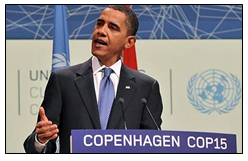By Kevin Mooney
Precious little progress has been made from the alarmist perspective since the United Nations climate change conference held last December in Copenhagen, Denmark, a blogger for the New York Times concedes. Looking ahead to the next conference, which opens at the end of November in Cancun, Mexico there is now speculation that this may be last gathering.
Although green activists continue to push for a binding international agreement to lower emissions, government officials are unlikely to advance any substantive measures.
“Now many are wondering whether the process itself, under the auspices of the United Nations Framework Convention on Climate Change, is so flawed that it should be scrapped,” the blog says. “Is it realistic to expect that 200 nations with vastly different interests, from China to Saudi Arabia to Bolivia to Micronesia, can come together to address a problem that will affect them in vastly different ways? Is there a better way to attack a global problem largely caused by a handful of large industrialized countries? Should the next so-called `conference of the parties’ be the last?”
Since the mid-1990s, the U.N. Intergovernmental Panel on Climate Change (IPCC) has been invoked as the final authority on the question of man-made global warming. But it has come under severe criticism recently over its methodologies and procedures.
The U.N. tasked The InterAcademy Council (IAC), based in Amsterdam, to investigate the IPCC. Its findings, published on August 30th concluded that the IPCC was predisposed toward conflicts of interest, made multiple assertions about climate change that lack scientific support, and inappropriately interjected itself into the policy making process.
Yes, the process is flawed but somehow the Times never gets around to raising questions about the so-called scientific consensus that has been used as a rationale for international regulatory agreements.
“A relatively small group of countries — the United States, China, Russia, India, Brazil and the European Union — are responsible for the vast bulk of global carbon emissions,” the blogger observes. “Why can’t they get together and agree on some common steps and a plan for providing aid to smaller, more vulnerable countries? Why do Cuba and Sudan have to sign onto whatever they agree to? In fact, such discussions now regularly take place outside the United Nations ambit, whether in the Group of 20 or other international forums, or in bilateral talks like those between the United States and China on clean energy innovation.”
Just prior to the November elections, the Times ran yet another editorial criticizing public officials who have raised questions about the evidence offered to support the idea that human activity has been driving climate change. This despite an avalanche of data that shows nature forces are largely responsible for warming and cooling trends.
Fred Singer, an atmospheric physicist and professor emeritus with the University of Virginia, suggests in a recent essay for The American Thinker that NYT become better acquainted with recent developments and the sentiment of its own readership.
“The NY Times may be seriously out of step with its own readers,” he wrote. “At least that’s how I would judge the results of a survey of readers of Scientific American, a magazine that has been just as alarmist about AGW as the Times:
“**77% believe that current climate change is caused by natural processes
“**68% think we should do nothing about climate change, are powerless to stop it
“**90% approve of climate scientists debating the issue in public forums
“**83% believe that the UN-IPCC is corrupt, prone to groupthink, and has a political agenda.
“The New York Times is doing a disservice to its readers and to the U.S. public in stoking unreasonable fears not based on solid science,” Singer concluded. But were we expecting anything else?
Kevin Mooney is a contributing editor to Americans for Limited Government (ALG) News Bureau, and the Executive Editor of TimesCheck.com.


